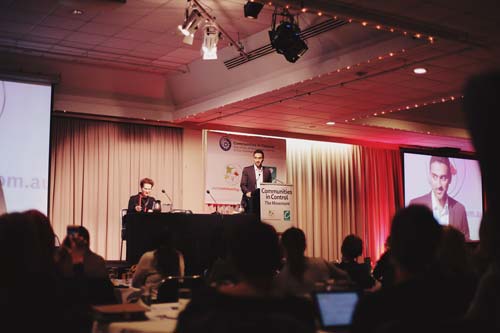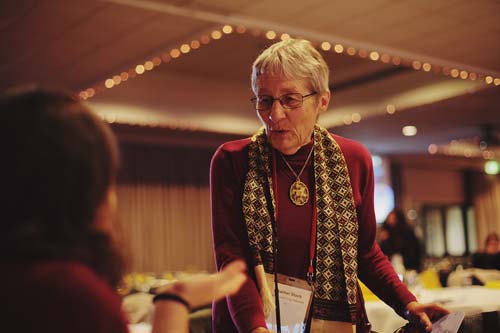The Communities in Control 2016 Conference, which took place 30 May – 31 May at the Moonee Valley Racecourse in Melbourne, Australia, was, as Professor Ian Harper stated, a place where, “people sharpen people as iron sharpens iron.” Delegates and not-for-profit sector representatives from every state of Australia gathered in a single venue to network, hear innovative speakers, debate, and trade information that will fuel their independent endeavors for years to come.
Forget what you’ve heard about stuffy conference rooms and esoteric panels. The conference, run by ourcommmunity.com.au, was packed with energy, egalitarianism, and tangible ways for everyone involved to amplify their communities.
CrowdInk had the opportunity to attend the event and here were our 10 favorite moments from the conference (in no particular order):
- The entire Joan Kirner Social Justice Oration, given by Waleed Aly.

Waleed Aly spoke frankly and eloquently on the very tricky subject of the root of horrific and antisocial behaviors within and on the outskirts of community: humiliation. He asserted that if an individual feels humiliated by a community, their reaction is to lash out, sometimes violently, sometimes passively, but always with spite and hatred. He admitted that there is no single solution to including everyone in community and making everyone feel valued. But a good place to start is to confer dignity. If everyone feels valued equally in the community, then they will invest in the community.
- Dr. Dennis Glover throws out some thought-provoking soundbites and engages in thoughtful debate with the entire audience.

We couldn’t pick a single quote from the first presentation of the conference, so we’re just going to give you our favorites:
- “Communities are in control when the economists are not.”
- “People who worked in factories used to be working class not the working poor. This is a historical fact.”
- “I am an economist that dislikes data [alone], because it stops us thinking through the full implications. Only stories tell us it all.”
- “Reform boosters have re-written the past to change the future. They have falsified it.”
- “Our solution is to invest in communities that have been forgotten. Stop wasting the potential of communities that were once prosperous to bolster the larger community. Those working communities need to be a part of our greater success.”
- Shellie Morris acknowledges land and country and opens conference in three indigenous languages.

Shellie Morris, 2014 Northern Territory Australian of the Year, walked onstage, pulled up a stool, bantered with ‘Mr. SoundMan’ and spoke a bit about her family, her community, and working with children and music to build and preserve community. Then she started the conference in true rockstar fashion, with three gorgeous tunes that incorporated (at least) 3 indigenous languages as well as English. It was a privilege to watch, to hear, and to feel and an acknowledgment of land that kept popping up in our heads as the conference continued. Which is the entire idea.
- The Economy, People, and The Planet presentation, focused on the power of video content to promote message and interact with audience.
The panel members, Krystal Barter (Founder, Pink Hope), Georgie Harman (CEO, beyondblue) Natalie Isaacs (Founder, 1 Million Women), as well as the facilitator, Jo Lim (Chief Operations and Policy Officer of auDA), worked in tandem to talk about the power of authentic stories communicated well. The big takeaways of the panel were the importance of taking the audience on an emotional journey (sad to happy or happy to sad), keeping it short, and TELLING YOUR STORY. You can have the best content in the world, but if it’s not real, the audience will know.
- Holly Ransom’s address on the need for intergenerational communication to build community.
Holly Ransom packed an hour-long speech with wit, careful distribution of useful statistics, inspiration, and hope for both Millennials and older generations: we can learn from each other, we just need to start speaking each other’s language in order to create as much positive change as possible. A few banger lines:
- “Many young people believe a social contract with them has be broken. They were told that if they do the learning, they’ll start earning. That’s not what happened.”
- “Millennials are 57% into the decision-making process before they come and talk to you. They have already done their research.”
- “Let’s loosen our grip on the tradition systems, structures, methods, and ways we impose our intentions on our audience.”
- Peter FitzSimons delivers a lot of truth underneath an hour of quick-witted, cavalier comedy.
In perhaps the most entertaining event of the conference, Peter FitzSimons had the entire room rolling with a non-stop social and political commentary that left us exhausted from laughing and hopeful for a more egalitarian Australia.
- He quoted Jerry Seinfeld, “I love your flag. It’s Great Britain at night.”
- “It is a point of pride that our leaders remain of the people. And we punish them if they get uppity.”
- On Prince George, “Doesn’t it get you [Aussies] that the third most qualified person to run Australia is 2 years old?!”
- “If more than half of Aussies want it changed, [newsflash], it is broke. So fix it.”
- Celeste Liddle reminds the room that Aboriginal Women have their own answers. Stop speaking for them.
- “We [aboriginal women] become the standard for the groups we represent when we stick out in a monoculture.”
- “Intersectionality [in feminism] should be the recognition that people in multiple marginalized groups are the most vulnerable.”
- “For every gain that an aboriginal woman makes in the political sphere, she is pushed back with gusto.”
- “White women and black men will have more rights than black women do.”
- “Aboriginal women are being spoken for rather than given the space to speak for themselves.”
- “The experiences of privileged white men are ‘aussie ideas.’ But aboriginal women have solutions. Listen.”
- Abe Nouk provides a gorgeous spoken word interlude loaded with truth and hope.
- “Do not gamble with your time. Your dreams and ambitions aren’t just about you anymore.”
- “People are trickling away without understanding what it means to be individuals in the community.”
- “Thank you, Australia [for accepting Abe’s family of refugees]. You used to be kind and I know you still can.”
- Magda Szubanski speaks on the language we use to exchange stories. And it was so important.
- “We all speak different languages. Business, community and government need to find a common language.”
- “When we’re hurt, when feelings are running high, empathy is VERY difficult to prioritise. We must.”
- “The LGBT community doesn’t have a built-in family at home like most minorities. We build our own community as we grow.”
- “It is the natural evolution of things to grow and change.”
- The snippets of discussion sparking around the presentations (particularly of college students invited to attend as scholarship receivers from Our Community.)

The questions asked during presentations, particularly from the younger attendees, left no wiggle room. A discussion of the LGBT community ousted from the Catholic Church during Magda Szubanski’s presentation. A discussion of what the Doveton population looks like now that challenged Dr. Dennis Glover’s proposed solution to the poverty Doveton now faces. A discussion during the communication panel on the importance of women in community – what we bring that’s different. A discussion of what economic growth actually means and if it is sustainable, forever.
These were the sparks that Professor Ian Harper asserted were so vital to community building. Not just the information presented, but all of the new issues that each solution provokes.

It was a privilege. We can’t wait for next year. Thank you.

![5 Reasons You Should Travel Alone Airplane [image source: chau nguyen/ http://thedevilhatessweatpants.blogspot.com.au ], crowd ink, crowdink, crowdink.com, crowdink.com.au](https://crowdink.com/wp-content/uploads/2016/08/Chau-airplane-218x150.jpg)




























![5 Reasons You Should Travel Alone Airplane [image source: chau nguyen/ http://thedevilhatessweatpants.blogspot.com.au ], crowd ink, crowdink, crowdink.com, crowdink.com.au](https://crowdink.com/wp-content/uploads/2016/08/Chau-airplane-100x70.jpg)


